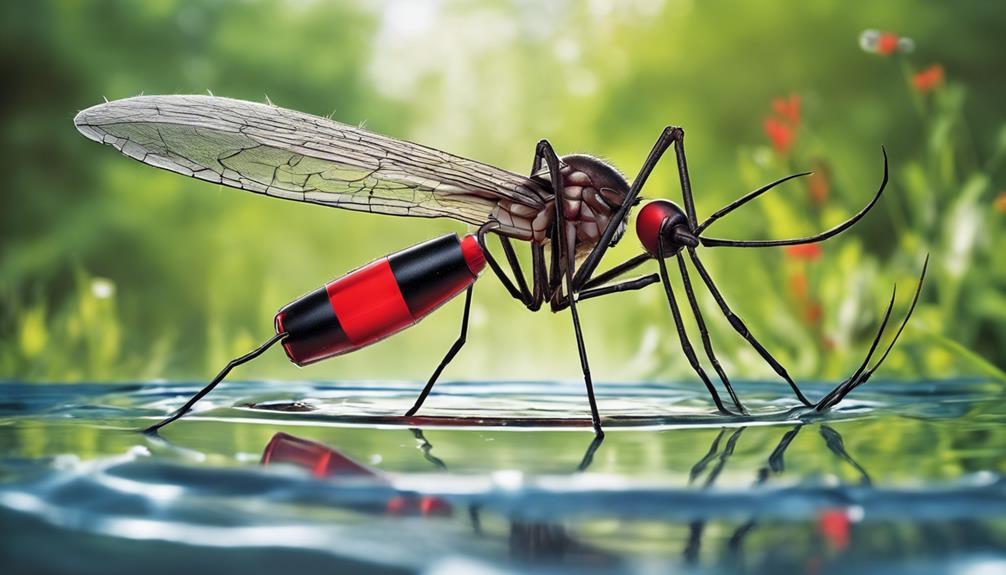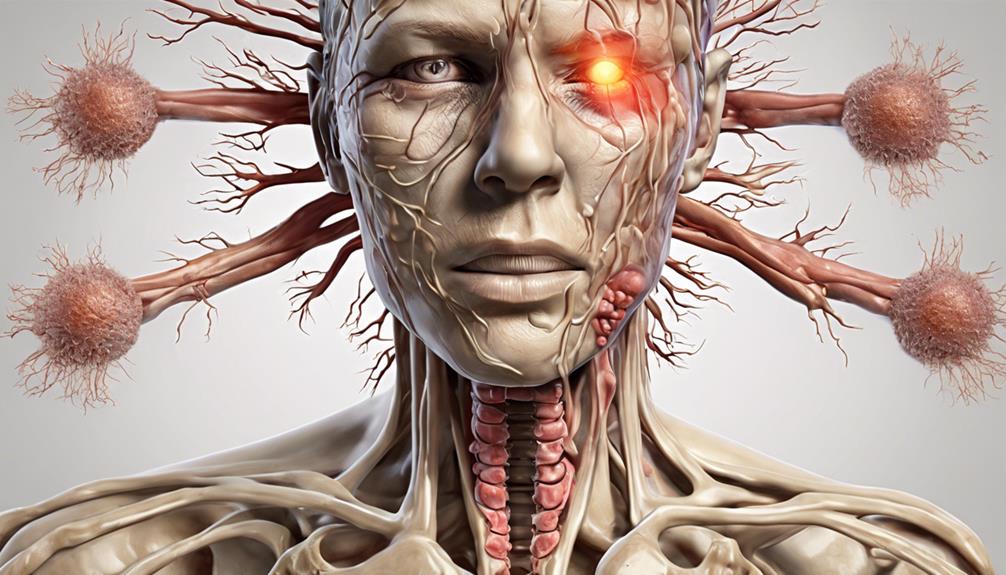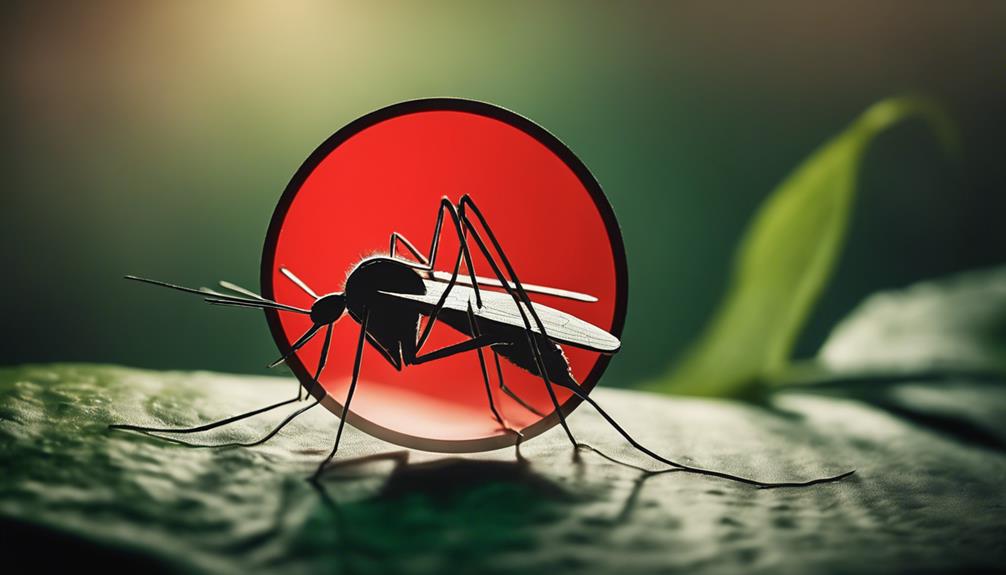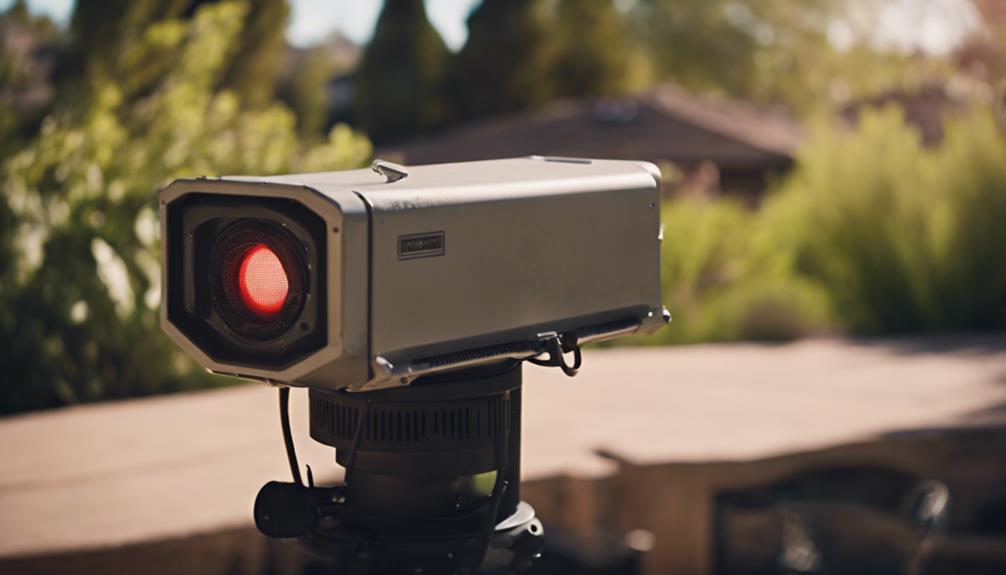To protect yourself in St. George, be aware that West Nile Virus spreads through mosquito bites. Use DEET insect repellents and wear long-sleeved clothing. Look out for symptoms like fever, headache, body aches, and rash. Seniors and those with health conditions face higher risk. Eliminate standing water where mosquitoes breed. Take precautions, especially during dawn and dusk. Early symptom detection is key for treatment. Stay informed to safeguard your health. Understanding more about West Nile Virus can help you stay safe in your community.
Key Takeaways
- Use DEET insect repellents and wear long-sleeved clothing for protection.
- Eliminate standing water to prevent mosquito breeding in St. George.
- Recognize symptoms like fever, headache, and rash for early treatment.
- Engage in public health initiatives and community clean-up events.
- Collaborate with neighbors and report standing water to the BCHU.
West Nile Virus: An Overview

When dealing with the threat of West Nile Virus in St. George, understanding the key characteristics of this mosquito-borne illness is essential. West Nile Virus, transmitted through mosquito bites, can affect various mammals, including humans, birds, and horses.
The primary carriers of this virus are Culex mosquitoes. To mitigate the risk of infection, it’s vital to implement preventive measures. Wearing protective clothing, applying insect repellents containing DEET, and eliminating sources of standing water where mosquitoes breed are effective strategies to reduce the transmission of West Nile Virus.
Being aware of the prevalence of West Nile Virus in St. George and taking proactive steps to safeguard yourself against mosquito bites can considerably lower the chances of contracting this potentially severe illness. By following these preventive measures, you not only protect yourself but also contribute to the overall community effort in combating the spread of West Nile Virus.
Stay informed, stay cautious, and stay protected.
Symptoms and Risk Factors
Understanding the symptoms and risk factors associated with West Nile Virus infection is vital for recognizing and addressing potential health threats effectively.
Most individuals infected with the West Nile Virus don’t exhibit any symptoms; however, some may experience fever, headache, body aches, and rash. It’s essential to note that less than 1% of those infected may develop severe neurologic illnesses like meningitis.
Seniors and individuals with underlying health conditions are at a higher risk of developing severe symptoms if infected with the West Nile Virus. Early detection of symptoms is key to the successful treatment and management of the illness.
Being vigilant about any signs of illness, especially during mosquito season, can help in prompt medical intervention if needed. Remember, prevention is better than cure – using insect repellents containing DEET, wearing protective clothing, and avoiding mosquito-infested areas can significantly lessen the risk of West Nile Virus transmission.
Stay informed and take necessary precautions to safeguard your health.
Prevention and Protection Tips

To protect yourself from mosquito bites and reduce the risk of West Nile virus transmission, make sure to use insect repellents with DEET and wear light-coloured, long-sleeved clothing during peak mosquito activity hours.
Additionally, eliminate any standing water in containers and promptly report potential breeding sites to the Brant County Health Unit for effective mosquito control measures.
Repellent Effectiveness Tips
For best protection against mosquito bites and the transmission of West Nile virus, using insect repellents that contain DEET is highly recommended.
Here are some tips to maximize the effectiveness of DEET repellents:
- Choose repellents with at least 20-30% DEET concentration for maximum protection.
- Apply DEET-based repellents evenly on exposed skin surfaces to guarantee thorough coverage.
- Reapply repellent every few hours, especially if you’re sweating or swimming, to sustain its effectiveness.
- Avoid applying DEET repellent under clothing to prevent skin irritation and ensure proper protection.
Eliminate Standing Water
To effectively protect against mosquitoes and the transmission of West Nile virus, one must take proactive steps to eliminate standing water around their property and community. Mosquito breeding occurs in stagnant water, making it essential to remove sources such as old tires and birdbaths to reduce the risk of West Nile virus transmission.
Standing water serves as a breeding ground for mosquitoes, increasing the likelihood of infection in the area. Regularly checking and emptying containers that collect water can greatly decrease the number of mosquitoes in the vicinity.
Taking preventive measures to eliminate standing water around homes and neighborhoods is vital in the fight against West Nile virus. Remember, a small step like getting rid of standing water can make a big difference in protecting yourself and your community.
Mosquito Control Measures
Implementing effective mosquito control measures is essential for minimizing the risk of West Nile virus transmission in St. George. To protect yourself and your community, follow these important steps:
- Wear protective clothing: Opt for light-colored, long-sleeved clothing to avoid mosquito bites.
- Stay indoors during peak hours: Reduce your exposure to mosquitoes by avoiding outdoor activities during dawn and dusk.
- Eliminate breeding sites: Remove water-filled containers and regularly change water in bird baths to prevent mosquitoes from breeding.
- Use DEET-based repellents: Safeguard yourself against mosquito bites and West Nile virus by applying approved insect repellents containing DEET.
Recognizing West Nile Virus Infection

You must be aware that symptoms of West Nile Virus infection can manifest as fever, headache, body aches, joint pains, vomiting, diarrhea, or rash.
It’s important to note that less than 1% of those infected may develop severe neurologic illnesses like meningitis.
Early recognition of these symptoms is vital for timely treatment and management of the disease.
Symptoms of Infection
Recognizing West Nile Virus infection involves being vigilant for symptoms such as fever, headache, body aches, joint pains, vomiting, diarrhea, and rash that can range from mild to severe. When it comes to West Nile Virus infection, it’s important to pay attention to how you’re feeling. Here are some key symptoms to look out for:
- Fever: A sudden onset of fever may indicate a possible West Nile Virus infection.
- Headache: Persistent or severe headaches could be a sign of the virus.
- Body Aches: Muscle aches and joint pains are common symptoms associated with the infection.
- Rash: Developing a rash, especially in conjunction with other symptoms, should prompt seeking medical advice promptly.
Being aware of these symptoms and seeking medical attention if you experience them is essential for early detection and treatment.
Treatment Options Available
Moving from symptoms to treatment, managing West Nile Virus focuses on alleviating symptoms through supportive care since there’s no specific antiviral therapy currently available. Supportive care includes rest, staying hydrated, and using pain relievers to ease discomfort.
Hospitalization might be necessary for severe cases, especially if the nervous system is affected. In instances where the virus causes severe neurological issues, treatment in an intensive care unit may be required. Early detection is vital for prompt medical intervention, enhancing the chances of a better outcome.
Prevention Methods Recommended
To effectively reduce the risk of West Nile virus infection, employing insect repellents containing DEET is essential in safeguarding against mosquito bites. Here are some prevention methods recommended to protect yourself from the Nile virus:
- Use insect repellents with DEET: Apply repellents to exposed skin and clothing.
- Wear long-sleeved, light-colored clothing: Minimize skin exposure to mosquitoes carrying the virus.
- Eliminate standing water: Remove sources where mosquitoes breed around your home.
- Change water in bird baths weekly: Prevent mosquitoes from laying eggs and spreading the virus.
Being proactive in these measures can greatly lower the chances of contracting West Nile virus. Stay vigilant and take steps to protect yourself and your community.
Community Action and Awareness
Active community engagement plays an essential role in combating the spread of West Nile virus in St. George by reducing mosquito breeding sites and enhancing surveillance efforts. Residents are key players in mosquito control, urged to report standing water to the BCHU to prevent the virus’s spread.
Collaboration with the BCHU in St. George not only enhances surveillance but also boosts public health initiatives against West Nile virus. Effective mosquito control and prevention of WNV transmission heavily rely on active community involvement.
Education and outreach programs in St. George are pivotal, promoting preventive measures and building community support for public health initiatives. By staying informed, reporting standing water, and participating in community efforts, you contribute significantly to safeguarding the well-being of St. George residents.
Your involvement is critical in the fight against West Nile virus, ensuring a healthier and safer environment for everyone in the community.
Frequently Asked Questions
Are Mosquitoes Bad in St George?
When it’s summer in St. George, mosquitoes can be pesky. Make sure to use mosquito repellent during outdoor activities to keep those buzzing bugs at bay. Stay protected and enjoy your time outside!
How Do You Stay Safe From West Nile Virus?
To stay safe from West Nile virus, protect yourself by wearing light clothing, using DEET insect repellents, and avoiding outdoor activities during peak mosquito hours. Watch for symptoms like fever and headache. Seek medical care for severe cases.
What Diseases Do Mosquitoes Carry in Utah?
When living in Utah, you should be aware that mosquitoes can carry various diseases. These mosquito-borne illnesses, prevalent in Utah mosquito populations, include West Nile virus, Zika virus, and St. Louis encephalitis. Preventive measures like repellents are essential.
What Should You Do if You Get Bit by a West Nile Mosquito?
If you get bit by a West Nile mosquito, wash the area with soap, apply a cold compress, and avoid scratching. Watch for signs of infection like redness or pus. See a doctor for severe symptoms.




